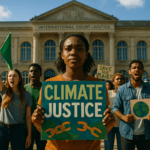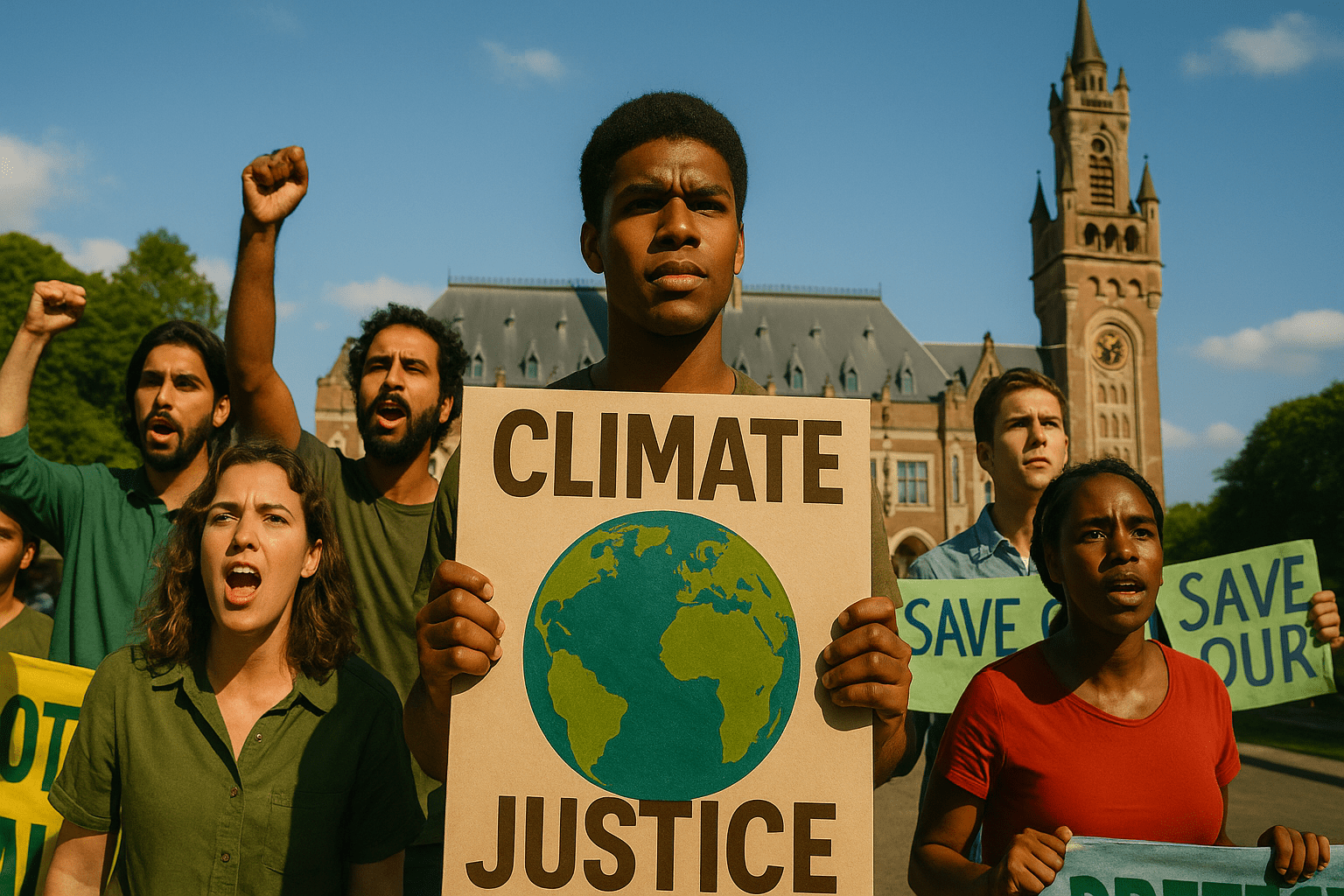

Climate Justice: A Global Imperative
By Darius Spearman (africanelements)
Support African Elements at patreon.com/africanelements and hear recent news in a single playlist. Additionally, you can gain early access to ad-free video content.
ICJ’s Landmark Climate Ruling
The International Court of Justice (ICJ), the United Nations’ top court, has delivered a groundbreaking advisory opinion concerning the climate obligations of nations (nationalobserver.com). This decision holds significant weight for the global response to climate change. A panel of 15 judges was tasked with answering two critical questions. First, what are countries obligated to do under international law to protect the climate and environment from human-caused greenhouse gas emissions? Second, what are the legal consequences for governments when their actions, or lack of action, have significantly harmed the climate and environment (npr.org, globalnews.ca)?
This non-binding opinion, which spans over 500 pages, is viewed as a potential turning point in international climate law (nationalobserver.com). The case was spearheaded by the Pacific island nation of Vanuatu and garnered support from more than 130 countries. It is important to note that all UN member states, including major greenhouse gas emitters like the United States and China, are parties to the court (apnews.com).
Understanding Advisory Opinions
An advisory opinion from the ICJ is a formal legal opinion provided by the court on a specific legal question. While these opinions are not legally binding in the same way a judgment in a contentious case is, they carry significant legal authority and moral weight. They serve to clarify international law and can influence the development of international legal norms. For instance, this opinion can serve as a basis for other legal actions, including domestic lawsuits and legal instruments like investment agreements (apnews.com).
UN organs or specialized agencies often request the ICJ’s advisory opinions. They help guide states in their international conduct and can be instrumental in shaping future treaties and agreements. In this instance, the opinion provides a clear interpretation of existing international law regarding climate change, offering a framework for states to understand their responsibilities and potential liabilities.
What is an Advisory Opinion?
An advisory opinion from the International Court of Justice (ICJ) is non-binding legal advice provided by the court. While it does not create legally enforceable obligations, it carries significant legal authority and moral weight, clarifying international law and influencing future legal developments.
Climate Change as a Human Right
The ICJ’s opinion strongly emphasizes that failing to protect the planet from climate change could constitute a violation of international law. Furthermore, it recognizes a “clean, healthy and sustainable environment” as a fundamental human right (nationalobserver.com). Court President Yuji Iwasawa explicitly stated that “Failure of a state to take appropriate action to protect the climate system … may constitute an internationally wrongful act” (nationalobserver.com).
The court also described the climate crisis as “an existential problem of planetary proportions that imperils all forms of life and the very health of our planet” (nationalobserver.com, reuters.com). This ruling opens the door for further legal actions. States could return to the ICJ to hold each other accountable, and domestic lawsuits could be filed. Additionally, legal instruments like investment agreements may be influenced by this opinion (nationalobserver.com, apnews.com).
Legal Consequences and Accountability
The concept of an “internationally wrongful act” means that a state has breached an international obligation. While the ICJ’s opinion is advisory, it provides a strong legal basis for future claims. For example, states harmed by climate change could seek reparations from nations failing to meet their obligations (nationalobserver.com). This could lead to a wave of climate litigation at both the international and domestic levels.
The ruling could also make it easier for states to hold other states accountable for climate-related issues, such as pollution or emissions (reuters.com). For communities in the African diaspora, particularly those in vulnerable coastal regions or agricultural areas, this could provide a new avenue for seeking justice against historical and ongoing climate injustices. The opinion strengthens the argument that climate inaction is not merely a policy failure but a breach of international law.
The Urgency of Climate Action
Climate activists gathered outside the ICJ, urging governments to take immediate action and highlighting the critical urgency of the climate crisis. Supporters of climate action chanted: “What do we want? Climate justice! When do we want it? Now!” (reuters.com). This protest underscored the public demand for accountability and swift measures to address climate change (apnews.com).
The voices of those most affected by climate change, including many from the African continent and its diaspora, are becoming louder. They are demanding that governments move beyond rhetoric and implement concrete policies to curb emissions and adapt to the changing climate. This ruling provides a powerful legal tool for these communities to press their demands.
Statistical Realities of Climate Change
Significant statistical data underscores the severe impacts of climate change, which prompted the ICJ’s advisory opinion. In the decade leading up to 2023, sea levels rose by a global average of approximately 4.3 centimeters (1.7 inches), with some parts of the Pacific experiencing even higher rises (npr.org, globalnews.ca). This rise threatens coastal communities, many of which are home to Black and Indigenous populations, leading to displacement and loss of livelihoods.
Furthermore, the world has warmed 1.3 degrees Celsius (2.3 Fahrenheit) since pre-industrial times, primarily due to the burning of fossil fuels (npr.org, globalnews.ca). This warming contributes to more extreme weather events, such as droughts, floods, and heatwaves, which disproportionately affect vulnerable communities in Africa and the diaspora, exacerbating existing inequalities.
Global Average Sea Level Rise (2013-2023)
This visualization shows the global average sea level rise over the decade leading up to 2023.
International Law and Treaties
The ICJ’s opinion references countries’ obligations under international law and treaties. Key agreements include the Paris Agreement and the Kyoto Protocol. The Paris Agreement, adopted in 2015, is a legally binding international treaty on climate change. Its goal is to limit global warming to well below 2, preferably to 1.5 degrees Celsius, compared to pre-industrial levels. Nations commit to nationally determined contributions (NDCs) to achieve this goal. The Kyoto Protocol, adopted in 1997, set binding emission reduction targets for developed countries. These treaties form the bedrock of international climate law, and the ICJ’s opinion provides a powerful interpretation of their implications.
The advisory opinion clarifies that these treaties are not merely aspirational but create concrete legal duties. For African nations, which often bear the brunt of climate change impacts despite contributing minimally to global emissions, this legal clarity is crucial. It provides a stronger basis for advocating for greater climate finance, technology transfer, and adaptation support from developed nations, aligning with the principle of common but differentiated responsibilities.
Intergenerational Equity and Responsibility
The principle of intergenerational equity is a guiding force in environmental protection. It means that the current generation has a responsibility to manage the Earth’s resources and environment in a way that does not compromise the ability of future generations to meet their own needs. The ICJ’s opinion implicitly supports this principle by emphasizing the long-term consequences of climate inaction and the need for states to protect the climate system for all forms of life.
This concept is particularly relevant for the African diaspora. Many communities have inherited environmental burdens from past industrialization and colonialism. Ensuring intergenerational equity means addressing these historical injustices and ensuring that future generations are not disproportionately affected by climate change. This includes safeguarding cultural heritage, traditional lands, and access to natural resources for future generations.
The Role of Non-State Actors
The court’s opinion also touches upon the obligation of states to regulate businesses within their jurisdiction. This means governments are responsible for ensuring that corporations operating within their borders do not contribute to climate change in ways that violate international law. This could lead to increased scrutiny of multinational corporations, especially those involved in fossil fuel extraction and other high-emission industries.
For communities in the African diaspora, this aspect of the ruling is vital. Many extractive industries, often foreign-owned, operate in African countries, sometimes with devastating environmental consequences for local populations. The ICJ’s opinion could empower African governments and civil society organizations to demand greater accountability from these corporations and ensure that their operations adhere to international environmental standards.
Global Warming Since Pre-Industrial Times
Increase in global temperature due to fossil fuels.
Challenges and Next Steps
Despite its significance, the ICJ’s advisory opinion is non-binding, which raises questions about its enforcement. How will this ruling influence actual state behavior? While countries are generally reluctant to ignore ICJ rulings, there are no direct enforcement mechanisms for advisory opinions. However, the opinion can serve as a powerful legal precedent for future contentious cases and domestic litigation. It empowers civil society and affected communities to pressure their governments for stronger climate action.
The ruling could also affect ongoing climate negotiations and domestic climate policies. It provides a legal framework for discussions at future COPs (Conference of the Parties) and strengthens the hand of vulnerable nations in demanding more ambitious commitments from major emitters. For the African diaspora, this means continued advocacy and engagement to ensure that the legal principles outlined by the ICJ translate into tangible improvements in environmental justice and climate resilience in their communities.
Legal Precedents and Global Impact
The ICJ’s opinion is part of a growing trend in international climate litigation. Earlier this month, the Inter-American Court of Human Rights, which has jurisdiction over 20 Latin American and Caribbean countries, issued its own advisory opinion. It stated that its members must cooperate to tackle climate change and have a legal duty to avoid environmental harm, as well as to protect and restore ecosystems (globalnews.ca). Last year, the European Court of Human Rights ruled that countries must do a better job of protecting their people from the consequences of climate change (globalnews.ca).
These rulings collectively build a robust body of international climate law. They signal a clear shift towards recognizing climate action as a legal obligation, not merely a political choice. This growing legal pressure can be a powerful catalyst for change, especially for nations and communities that have historically been marginalized in global climate discussions. It provides a legal foundation for demanding climate justice and holding polluters accountable.
ABOUT THE AUTHOR
Darius Spearman has been a professor of Black Studies at San Diego City College since 2007. He is the author of several books, including Between The Color Lines: A History of African Americans on the California Frontier Through 1890. You can visit Darius online at africanelements.org.
